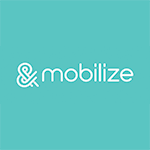Description

Mobilize

Eventcube

RecDesk
Comprehensive Overview: Mobilize vs Eventcube vs RecDesk
Certainly! Here's a comprehensive overview of Mobilize, Eventcube, and RecDesk, including their primary functions, target markets, market share, user base, and key differentiators:
Mobilize
a) Primary Functions and Target Markets
- Primary Functions: Mobilize is a community management platform designed to facilitate engagement and communication within membership-based organizations. It offers features like a community hub, virtual events, member directory, communication tools, analytics, and administrative tools.
- Target Markets: Mobilize primarily targets associations, professional networks, non-profits, and other organizations looking to manage and engage their communities more effectively.
b) Market Share and User Base
- Market Share: Mobilize operates in a niche market focusing on community management. It is not as large as major CRM or collaboration tool providers but maintains a stable presence in community-centric organizations.
- User Base: Mobilize has users across various sectors that require robust community management. Its user base includes several hundred organizations globally, particularly those focused on member engagement.
c) Key Differentiating Factors
- Community-Centric Features: Unlike generic CRM systems, Mobilize is specifically designed with features that focus on building and nurturing member relationships.
- User Engagement Tools: It provides multiple channels of engagement such as discussion boards, events, and one-to-one messaging.
- Comprehensive Analytics: Offers in-depth engagement analytics that help organizations understand and improve member participation.
Eventcube
a) Primary Functions and Target Markets
- Primary Functions: Eventcube is an event management platform that provides tools for ticketing, live streaming, virtual and hybrid events, and membership management. It aims to offer a customizable and integrative approach to event management.
- Target Markets: Eventcube caters to event organizers, conference planners, music venues, sporting events, and businesses looking to host virtual events.
b) Market Share and User Base
- Market Share: Eventcube is a mid-sized player within the event management software industry, which includes giants like Eventbrite and Cvent.
- User Base: Eventcube’s user base is diverse, encompassing small to medium-sized businesses, non-profits, and independent event organizers who prefer a customizable solution.
c) Key Differentiating Factors
- Customization: Unlike many event platforms, Eventcube allows for significant customization, offering branded experiences and integrations.
- Virtual Event Support: Strong capabilities in hosting virtual and hybrid events, including live streaming functionalities.
- Payment Flexibility: Offers flexible payment options including a white-label ticketing solution, which stands out from competitors.
RecDesk
a) Primary Functions and Target Markets
- Primary Functions: RecDesk is a recreation management software that facilitates program registration, facility scheduling, membership management, and more for community recreation departments.
- Target Markets: Specifically targets municipal parks and recreation departments, community centers, and other organizations involved in offering recreational programs.
b) Market Share and User Base
- Market Share: RecDesk is a focused player in the recreation management niche and competes with others like ActiveNet and CivicRec.
- User Base: Used by various local government recreation departments and community organizations, RecDesk has steadily grown its user base across the United States.
c) Key Differentiating Factors
- Ease of Use: Known for its user-friendly interface, RecDesk is designed for non-technical users in community services.
- Community Focused Features: Offers features tailored specifically for community recreation, like program catalogs, facility rentals, and sports league management.
- Affordable Pricing Model: Often more affordable than larger, more comprehensive systems, making it accessible for smaller municipalities.
Comparative Summary
- Mobilize vs. Eventcube vs. RecDesk: Mobilize focuses on community management and engagement, Eventcube on event management and ticketing, and RecDesk on recreation management. Their markets overlap minimally, as each serves distinct organizational needs.
- Market Positioning: All three cater to specialized needs—Mobilize for member communities, Eventcube for customizable event solutions, and RecDesk for recreation departments.
- Customization and Usability: Eventcube and RecDesk offer high customization and tailored solutions, while Mobilize excels in engaging community interactions and analytics.
Each product brings unique strengths to its target audience, making them leaders in their respective niches.
Contact Info

Year founded :
2017
Not Available
Not Available
United States
Not Available

Year founded :
2013
+44 77 1022 7278
Not Available
United Kingdom
http://www.linkedin.com/company/eventcube-solutions

Year founded :
Not Available
Not Available
Not Available
Not Available
Not Available
Feature Similarity Breakdown: Mobilize, Eventcube, RecDesk
To provide a feature similarity breakdown for Mobilize, Eventcube, and RecDesk, we'll evaluate the platforms based on their core features, user interfaces, and unique aspects that differentiate them from one another. This analysis is based on the general offerings of each platform up to the latest available data.
a) Core Features in Common
Mobilize, Eventcube, and RecDesk all serve as tools for community and event management, and they share several core features:
-
Event Management:
- All three platforms offer robust event management capabilities that include event scheduling, registration management, and ticketing systems.
-
Community Engagement:
- Each tool offers features to engage communities or groups. This includes communication tools like emails or messaging systems to keep members informed and connected.
-
Member Management:
- They provide tools to manage member or attendee information, maintaining databases that can track interactions and support relationship-building efforts.
-
Customizable Interfaces:
- Customization options are available for event pages, registration forms, and emails, allowing organizations to maintain branding and personalize user experiences.
b) User Interface Comparison
-
Mobilize:
- The user interface is community-centric, focusing on ease of use for both organizers and members. Mobilize emphasizes a clean, minimalistic design that fosters straightforward navigation and communication.
-
Eventcube:
- Eventcube offers a visually appealing interface with a focus on ticketing and event management. Its design tends to be more graphical, leveraging modern design principles with intuitive navigation that prioritizes user accessibility and experience, especially for event attendees.
-
RecDesk:
- RecDesk provides a more utilitarian interface geared towards community and recreational program management. The design is straightforward but may appear dated compared to other modern solutions. It focuses on functionality and easy access to booking and program management features.
c) Unique Features
-
Mobilize:
- Community Forum:
- Mobilize's standout feature is its focus on building community networks. It offers extensive community management features, including forums and sub-groups that help foster peer interaction beyond simple event management.
- Community Forum:
-
Eventcube:
- Advanced Ticketing:
- Eventcube sets itself apart with its sophisticated ticketing solutions, including options for tiered pricing, discounts, and custom ticket designs. It also supports virtual events through integrations with streaming services, making it versatile for different event formats.
- Advanced Ticketing:
-
RecDesk:
- Recreation Program Management:
- RecDesk is unique in its focus on recreation department needs, offering program scheduling, facility booking, and league management tools. This specialization makes it particularly valuable for municipal and community organizations focused on sports and recreation.
- Recreation Program Management:
In summary, while Mobilize, Eventcube, and RecDesk share foundational features related to event and community management, they each have specific strengths—the community-oriented network of Mobilize, the sophisticated event ticketing systems of Eventcube, and the recreation program management capabilities of RecDesk—that cater to different organizational needs.
Features

Not Available

Not Available

Not Available
Best Fit Use Cases: Mobilize, Eventcube, RecDesk
Each of these platforms—Mobilize, Eventcube, and RecDesk—serves unique functions and is tailored to specific types of organizations and scenarios. Here’s an overview of their best fit use cases, catered industries, and applicable company sizes:
a) Mobilize
Use Cases:
- Types of Businesses/Projects: Mobilize is best suited for community-driven organizations, membership-based groups, non-profits, professional associations, and advocacy groups seeking to strengthen engagement and collaboration among members.
- Key Scenarios: When an organization needs to build a strong community network, facilitate member communication, organize events, and manage member data effectively, Mobilize is a suitable choice.
Industry Vertical/Company Size:
- Industries: Non-profits, educational institutions, alumni groups, trade organizations, and advocacy groups.
- Company Size: Small to medium-sized organizations that focus on community engagement or rely heavily on volunteer coordination and member management.
b) Eventcube
Use Cases:
- Types of Businesses/Projects: Eventcube is ideal for event organizers, conference planners, entertainment venues, and sports clubs that require comprehensive event management and ticketing solutions.
- Key Scenarios: When there is a need for detailed event management, ticket sales, virtual and hybrid event capabilities, and financial handling through custom ticketing.
Industry Vertical/Company Size:
- Industries: Entertainment, sports, corporate event management, education (for conferences and workshops), and any industry hosting large-scale public events.
- Company Size: Medium to large enterprises or specialized event agencies which handle complex events and require advanced ticketing features.
c) RecDesk
Use Cases:
- Types of Businesses/Projects: RecDesk is particularly useful for parks and recreation departments, municipalities, community centers, and fitness/wellness facilities needing a platform for activity registration, facility scheduling, and program management.
- Key Scenarios: When there is a need for a comprehensive suite to manage community recreation programs, facility rentals, memberships, and online registrations efficiently.
Industry Vertical/Company Size:
- Industries: Public sector recreation and leisure services, private community centers, local government departments, and schools.
- Company Size: Typically targets small to mid-sized municipalities and organizations that manage a variety of community programs and facilities.
d) Catering to Different Industry Verticals or Company Sizes
- Industry Verticals: Each product aligns with specific verticals—Mobilize with membership and community-driven organizations, Eventcube with entertainment and event management industries, and RecDesk with local government and community recreation services.
- Company Sizes:
- Mobilize is generally more effective for small to medium-sized organizations that need to manage community engagement.
- Eventcube scales well from mid-sized firms to larger enterprises needing sophisticated event management capabilities.
- RecDesk serves small to mid-sized municipalities or community-based organizations focusing on scheduling and program activity management.
Each platform brings its specialized features and services to the table, making them preferable for different operational needs and organizational goals.
Pricing

Pricing Not Available

Pricing Not Available

Pricing Not Available
Metrics History
Metrics History
Comparing teamSize across companies
Conclusion & Final Verdict: Mobilize vs Eventcube vs RecDesk
Creating a conclusive evaluation of Mobilize, Eventcube, and RecDesk involves analyzing their distinct features, value propositions, and potential use case scenarios. Below is a structured conclusion that addresses your questions:
a) Best Overall Value
Mobilize offers the best overall value for community-driven organizations. It excels in managing memberships and community engagement through its user-friendly interface and comprehensive communication tools. The value it provides is especially significant for groups that need dynamic interaction capabilities.
b) Pros and Cons of Each Product
Mobilize:
- Pros:
- Strong focus on community building and engagement.
- Comprehensive suite of communication tools, including forums, direct messaging, and newsletters.
- Easy-to-use interface with powerful administrative controls.
- Cons:
- May not have extensive event management features compared to dedicated event platforms.
- Could require a steeper learning curve for teams accustomed to more traditional CRM systems.
Eventcube:
-
Pros:
- Robust event management capabilities, including ticket sales, analytics, and customization options.
- Integration with various payment gateways and marketing tools.
- Suitable for organizations requiring end-to-end event solutions.
-
Cons:
- Primarily event-focused, potentially lacking in broader community management features.
- Possible additional costs associated with payment processing and advanced features.
RecDesk:
-
Pros:
- Excellent platform for recreation and municipal organizations needing to manage programs and facilities.
- Comprehensive enrollment and scheduling tools tailored for recreation services.
- User-friendly interface designed for ease of use by both administrators and participants.
-
Cons:
- Limited in features outside the scope of recreation and facility management.
- May not be suitable for non-recreational organizations or those focusing on event management or community engagement outside of recreation.
c) Recommendations for Users
-
Community-Focused Organizations: Mobilize is ideal for groups looking to strengthen member relationships and have strong communication channels. Its tools make it an excellent choice for member-driven engagement and community building.
-
Event-Centric Needs: Eventcube stands out for organizations whose primary focus is on hosting and managing events. Its sophisticated event management features provide comprehensive solutions for ticket sales, event marketing, and attendee management.
-
Recreation and Program Management: RecDesk is specifically designed for municipal and recreational entities. It's best for organizations managing recreational programs, facility bookings, and community services, offering tools that simplify these processes.
In determining the best product, consider what is most critical to your needs: Mobilize for communication and community, Eventcube for event management, and RecDesk for recreation programs. Evaluate trial versions if available and consider long-term scalability and integration requirements to ensure a match with your organizational goals.